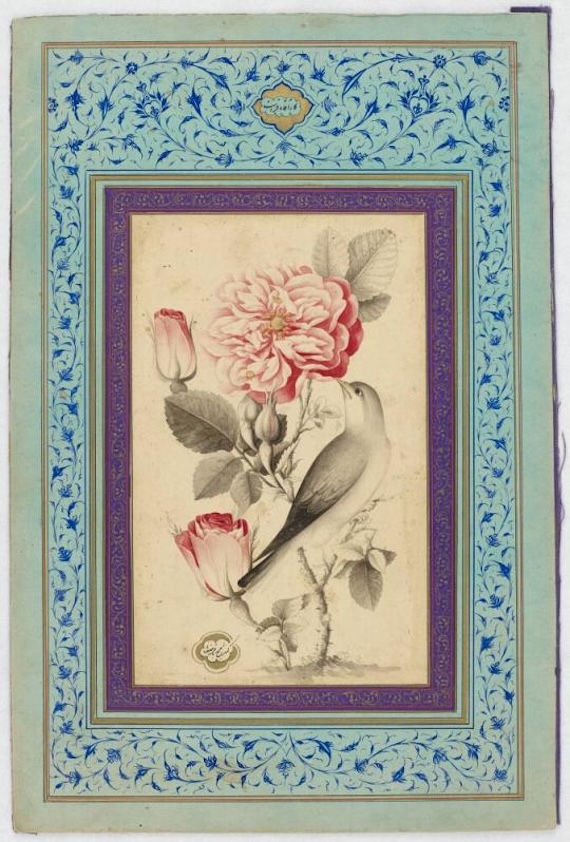Stanza no. 13 of the first edition of Edward FitzGerald’s translation of The Rubáiyát of Omar Khayyám is about the free gifts we receive from nature.
XIII.
- Look to the Rose that blows about us — “Lo,
“Laughing,” she says, “into the World I blow:
“At once the silken Tassel of my Purse
“Tear, and its Treasure on the Garden throw.”
A. J. Arberry wrote that it is based on poem no. 398 in the Calcutta manuscript, which can now be found here:
گل گفت که دست زرفشان آوردم
خندان خندان سر به جهان آوردم
بند از سرِ کیسه برگرفتم رفتم
هر نقد که بود در میان آوردم
I translate it this way in blank verse:
The rose proclaimed, “My hand cast forth the gold;
I blossomed, laughing, up into the world.
I have untied my purse and emptied out
the cash that was inside into your midst.
Transliteration:
gol goft ke dast-e zar-fishān āvardam,
khandān khandān sar be jahān āvardam.
band az sar-e kīsa bar-gereftam raftam,
har naqd ke būd dar miyān āvardam.
Arberry says FitzGerald wrote in the margin of this poem, “very pretty.” As a secular man who owned vast estates, he loved nature and liked sometimes to get his hands dirty in soil, so he appreciated the lesson here, that nature bestows its priceless gifts on us unasked.
Iranian poets often praised the generosity of nature. As Aisha Abdelhamid observed, Rumi wrote,
- “Be like the sun for grace and mercy.
Be like the night to cover others’ faults.
Be like running water for generosity.
Be like death for rage and anger.
Be like the Earth for modesty.
Appear as you are.
Be as you appear.”
—-
Order Juan Cole’s contemporary poetic translation of the Rubáiyát from
or Barnes and Noble.
or for $16 at Amazon Kindle
——
As for the rose, it is a symbol for a lot of things in Persian poetry, including boundless and unexpected generosity.
Hushang A`lam explains in the Encyclopaedia Iranica that Hafez of Shiraz (d. 1390) called the rose “the king of beauty,”
and he identifies four basic contexts in which it appears in Persian poetry.
1. It is a symbol and a feature of spring, and thus of renewal. Moḥammad-Taqi Bahār (d. 1950) wrote, “The new spring arrived, and the red rose laughed.” A`lam explains that for the rose to “laugh” means that it opened out.
2. Roses are also contrasted to thorns, so that Saadi (d. 1291) in the Golestan [Rose-Garden] says, “Wherever there is a rose, there are thorns.” A`lam writes, “This contrast between the rose, symbolizing beauty and smoothness, and thorn as a symbol of harshness has often been utilized by poets to convey the general idea that success in attaining one’s goal is usually concomitant with hardship, or that pleasures are often marred by annoyances such as thorns scratching the hand wishing to pluck a rose.”
3. Roses frequently appear as the beloved of the nightingale, symbolizing passionate and even obsessive love. For mystics, this is the unquenchable thirst of the soul (the nightingale) for God (the rose).
4. The rose can also refer to the beloved’s face, so that pink cheeks are compared to the rose. A beloved is “rose-faced” or gol-rokh.

“Roses and Nightingale,” by Muhammad Baqir (Persian, active 1740s–1800s), Ink and watercolor on paper, gift of Nasrin and Abolala Soudavar, Object number 2015.97, The Museum of Fine Arts, Houston.
An example is the beginning of a ghazal or ode of Hafez, no. 25:
The red rose blossomed and the nightingale fell drunk;
You Sufis who love wine, the call to joy is heard!
—-
For more commentaries on FitzGerald’s translations of the Rubáiyát, see
FitzGerald’s Rubáiyát of Omar Khayyám: Commentary by Juan Cole with Original Persian


 © 2026 All Rights Reserved
© 2026 All Rights Reserved